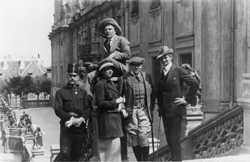CineFest 2007
4th International Festival of German Film Heritage
Hamburg: 17 - 25 November 2007
Film in the heart of Europe
German-Czech Film Relations in the 20th century

Shooting of "Der Student von Prag" (1926, Henrik Galeen))
German, Austrian and Czech cultures share an intensive and problematic history. Two World Wars led to drastic changes and cultural conflicts which had a continuous effect on the countries’ relations with each other. Nowhere are the ever-changing developments and various facets of these precarious relations more explicitly projected than in film.
The “Golden City” on the Vltava inspired German films (Der Student von Prag), while – starting in the late 1920s – the Czech actress Anny Ondra/Ondráková dazzled German audiences as a buoyant flapper in comedies directed by her compatriot Karel/Carl Lamač. Lída Baarová followed her as an exotic vamp who conquered the hearts of German men both on and off the screen, e.g. Propaganda Minister Goebbels.
Early sound films encountered a special situation in Czechoslovakia, where both German and Czech were the primary languages. As a result, Multi Language Versions, such as “C. ak. polní Maršálek” / “Der k.u.k. Feldmarshall” (1930) and “Ulička v ráji” / “Das Gässchen zum Paradies” (1936), were produced.
Czech film production under Nazi occupation in the “Reichsprotektorat” of Bohemia and Moravia, as well as German films which were produced in Prague studios during World War II, will also be discussed.
Throughout the century there have been many excellent examples of German-Czechoslovakian co-productions such as “Ein Mädel von der Reeperbahn” / “Lidé v bouři” (1930), “Jahrgang 21” / “Ročník jedenadvacet” (1957) and “Král' drozdia brada” / “König Drosselbart” (1986).
Films like “Hangmen Also Die!” (1942), “Nemá barikáda” (1949), “Ostře sledované vlaky” (1966), “Der Mädchenkrieg” (1976/77), “Hilde, das Dienstmädchen” (1985/86) and “Želary” (2003) show the continuing interest of German and Czech film directors to deal with the experiences of occupation, war and displacement.
CineFest and the Film History Conference in Hamburg will pursue the careers of stars, investigate structures of production, and explore the history of film motifs in Berlin, Vienna and Prague.
in Cooperation with
Narodní filmový archiv, Prag
Univerzita Karlova, Prag
Kinemathek Hamburg - Kommunales Kino Metropolis
Deutsches Historisches Museum / Zeughauskino, Berlin
Filmarchiv Austria, Wien
Cinémathèque Suisse Lausanne / Filmpodium Zürich
and
Absolut MEDIEN, Berlin
with friendly support of
Arte, Straßburg
Adalbert Stifter Verein, München
DEFA Stiftung, Berlin
Deutsch-Tschechischer Zukunftsfonds, Prag
Deutsche Kinemathek - Museum für Film und Fernsehen, Berlin
Deutsche Wochenschau GmbH, Hamburg
Deutsches Filminstitut – DIF, Frankfurt
Filmförderung Hamburg Schleswig-Holstein GmbH
Friedrich-Wilhelm-Murnau-Stiftung Wiesbaden
Goethe-Institut, Prag und München
Icestorm Entertainment GmbH, Berlin
Kinowelt GmbH, Leipzig
Märchen-Stiftung Walter Kahn, Volkach
MediaDesk Deutschland, Hamburg
Skoda Auto Deutschland GmbH
TaurusMedia, Unterföhring
Tchibo Coffee Service, Hamburg
Transit Film GmbH, München
Universität Hamburg – Institut für Neuere deutsche Literatur und Medienkultur
Media partner: FilmDienst
CineGraph – Hamburgisches Centrum für Filmforschung e.V. is funded by the Hamburg department of culture (Kulturbehörde der Freien und Hansestadt Hamburg)
![]()